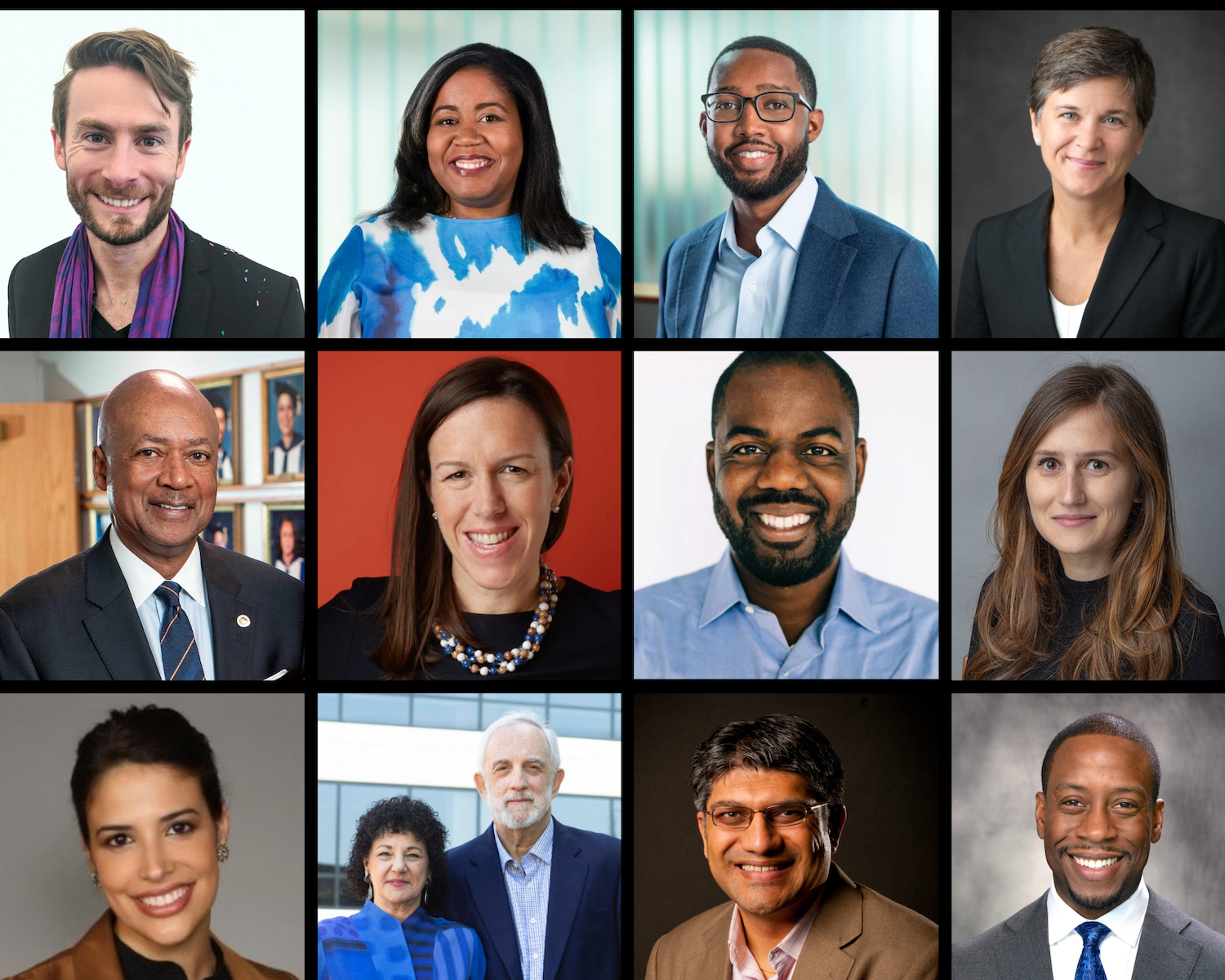ImpactAlpha, Dec. 21 – Real solutions. Real revenues. Real places.
While other investors chased crypto and other tech fads, inclusive investors were finding impact alpha in companies expanding access to health care, education, housing, good jobs and economic opportunity.
“In all the investments we make, we’re thinking, ‘How do we invest in companies that close gaps for low-income communities and or communities of color?’” Brian Dixon of Kapor Capital told ImpactAlpha’s David Bank in an Agents of Impact podcast in June. Kapor this year raised $126 million for its third fund to invest in underrepresented founders of early-stage startups.
“We know that our style isn’t for everyone,” says Dixon. “But we think it’s generated top-quartile returns in the past and will continue to do so in the future.”
Investors able to spot underappreciated opportunities and identify entrepreneurial talent overlooked by other investors can outperform the market. Fund managers investing to close equity gaps and expand the supply of essential goods and services closed more than a dozen funds 2022.
By expanding the supply – and driving down the cost – of quality healthcare, education, good jobs, affordable housing, clean energy and regenerative agriculture, such strategies can help execute a “soft landing” of fighting inflation without triggering a recession.
Serena Williams’ Serena Ventures raised $111 million to back diverse founders building inclusive solutions. HCAP Partners raised $353 million to take its good jobs strategy nationwide. And Town Hall Ventures raised a $350 million fund to improve how health care is delivered to underserved communities.
Among the trends we’re watching in 2023:
Abundance agenda
Impact, community and sustainability investors have long been practitioners of what the Biden administration is coming to call “supply-side progressivism.” The policy agenda cleverly rebrands the old tax-cut version of supply-side economics to increase the production (and reduce the costs) of energy, home-grown manufacturing and other social goods. Case in point:
“Treasury hit the ball out of the park!” Laurie Spengler of Courageous Capital Advisors and George Surgeon of GSJ Advisors write in a new guest post that admits they were wrong last year in criticizing the $9 billion Emergency Capital Investment Program that is pumping badly needed equity capital into community development financial institutions. The program, they now say, “tees up, perhaps for the first time in recent history, the chance to serve underserved communities at scale with responsive financing.”
The broader abundance agenda recognizes that the old model of subsidizing the costs of scarce social goods and services actually drives up costs, as journalist Ezra Klein explains. In contrast, creating and deploying more renewable energy, housing, education and healthcare may be “the best means to achieve the ends that we care about: more comfortable lives, with more power to do what we want, with more time devoted to what we love,” writes The Atlantic’s Derek Thompson.
- ‘Supply-side’ policies can leverage private capital for public good
- Coalfield Development: Forging a path for Appalachia’s green economy
- Taj Eldridge of Include Ventures: Putting the cool in climate action
Repricing risk to root out systemic biases
From business investing to municipal bond markets, inclusive investors are working to correct systemic mispricing of risk that has driven up the cost of capital based on non-financial factors such as race, gender and geography. In munimarkets, for example, “the Black tax” can add nearly half a percentage point to borrowing costs for cities with higher proportions of Black residents.
Public Finance Initiative’s Lourdes German is mobilizing muni market issuers, underwriters and investors to tilt the market away from extraction and toward racial equity, as we’ve highlighted in “Muni Impact,” our deep dive into the $4 trillion municipal bond market, supported by the Robert Wood Johnson Foundation. The goal: better tools and data to help muni market investors spot racial biases and mispriced risks.
- Mispriced risks, investor demand and community power center racial equity in municipal bonds (video)
- Managing social risks and addressing racial inequities in the muni bond market
- The ‘Black Tax’ plagues small municipalities. Can bond banks help?
- What Adasina learned about advancing ‘fiscal justice’ by investing $60 million in muni bonds
Claiming ownership to build wealth
Ownership of homes, buildings and businesses – rather than wages – represents the clearest path to wealth in America. Structures are proliferating to expand ownership to create generational wealth for families and communities where equity has been out of reach. Employee ownership trusts that help business owners transfer ownership to employees, for example, represent “one of the largest Archimedes levers of our generation to shift toward a shared-ownership economy,” says Zoe Schlag of Common Trust, which finances such conversions. The U.S. omnibus spending bill released this week includes support for Employee Stock Ownership Plans.
In housing too, investable models for collective ownership, renter payouts and neighborhood trusts are expanding access to housing wealth. In Denver, the Dearfield Fund for Black Wealth has helped more than 100 families buy homes with shared-equity financing to meet down payments. In Austin, Just is creating “wealth clubs” to help small-business borrowers become real estate investors. The Renter Wealth Creation Fund from Columbia, Maryland-based Enterprise Community Partners, provides a payout to longtime tenants of affordable housing – 80% of the profits – when the properties are refinanced or sold.
- Through ‘ownership trusts,’ investors can help employees become owners and owners retire
- Collective ownership, renter payouts and neighborhood trusts expand access to housing wealth
- Napoleon Wallace, Southern Reconstruction Fund: Restorative capital for Black wealth
- John Holdsclaw IV, Rochdale Capital: Advancing co-ops and community ownership
Alternative capital for growing businesses
Venture capital and bank loans finance less than 20% of new businesses. A parallel market of equity, debt and hybrid capital is rising to grow businesses, create jobs and generate wealth. “Power shouldn’t be concentrated in the hands of millionaires and VC funds,” says Jonny Price of WeFunder, an online startup platform. Companies with a Black or Brown founder last year received roughly one third of the $500 million raised through such crowdfunding sites, compared to just 2.6% of venture capital overall.
Among the new financing structures: Revenue-based financing (Founders First and 1863 Ventures), character-based loans (Common Future) and impact notes (ICA), along with impact-aligned SAFE structures.
- Alternatives to venture capital keep financing flowing to diverse founders.
- Business financing beyond venture capital to fuel the boom in entrepreneurship (video)
- Startups raise ‘community rounds,’ turning customers and fans into investors
- ‘Impact notes’ help entrepreneurs recoup equity by creating good jobs and community wealth
Diversity alpha in asset management
A growing body of research suggests that diverse-led fund managers outperform less diverse firms, including by identifying underappreciated markets or opportunities and spotting entrepreneurial talent overlooked by other investors. VC Include’s new cohort of a dozen diverse impact managers brings the platform’s portfolio to 32 fund managers, including 10 diverse-led climate funds.
“We’re trying to change hearts and minds around where the opportunity set is,” VC Include’s Bahiyah Robinson told ImpactAlpha’s David Bank in an Agents of Impact podcast. Check out David’s interviews with managers in VC Include’s portfolio, including Aisha Weeks of the Dearfield Fund for Black Wealth and Toussaint Bailey of Uplifting Capital. Gratitude Railroad’s Inclusive Capital Fund, launched earlier this year, helps overcome the institutional and implicit barriers that block white female and managers of color from raising capital.
- Fairview Capital’s emerging wisdom about emerging and diverse fund managers (podcast)
- Emerging fund managers form pooled investment vehicle to raise capital for overlooked founders
- Emerging impact fund managers tap ‘community rounds’ to overcome fundraising barriers
- Three ways to move your private equity firm closer to racial justice – and create value
- Thoughts of a Black fund manager
Creating new markets for impact
Creative economy. Independent news. Migrants and other people on the move and the long-COVID population. To help markets deliver social goods, inclusive investors are building new markets and defining new opportunities.
More than 100 million people worldwide, for example, never recovered from the Coronavirus. “I want to show that there is a market opportunity in helping COVID Long Haulers and shift capital and policy support in that direction,” says Ibrahim Rashid, who built Strong Haulers to accelerate the shift.
- Upstart Co-Lab’s pipeline of creative economy deals is now an investable impact strategy
- Six ways to build the Long COVID economy
- Displaced East Africans remake camps into testbeds for refugee-lens investing
- Nearly a dozen independent news organizations in Nigeria get support from Media Development Investment Fund
- Migration surge spurs impact funds to target financial services for people on the move
New funds with inclusive theses
Fund managers investing to close equity gaps and expand access to essential goods and services raked in capital this year. Watch for even larger funds in 2023.
- Kapor Capital attracts outside investors to $126 million fund to close equity gaps
- HCAP Partners raises $353 million to take its good jobs strategy nationwide
- Town Hall Ventures raises a $350 million fund to improve how health care is delivered to underserved communities
- Trinity Church Wall Street commits $20 million to MSquared’s New York affordable housing fund
- Dearfield Fund secures $7.5 million to help Black first-time homeowners make down payments
- Equitable Facilities Fund closes $230 million in social bonds for underserved charter schools
- Aristata Capital raises £40 million for impact litigation fund to close the ‘justice gap.’
- SoLa Impact affordable housing fund secures $15 million from Equitable
- LGBTQ+ focused venture capital firm comes out for Pride month
- LISC raises $100 million to expand Entrepreneurs of Color Loan Fund
- BlackRock raises an $800 million impact fund to invest in communities of color
- SteelSky Ventures raises $47 million to back women’s health ventures
- Serena Ventures raises $111 million to back diverse founders building inclusive solutions
Inclusive tech meets demand for ‘social infrastructure‘
Startups aiming to streamline social services, upskill workers and finance small businesses are closing large rounds. Impact ventures have proved resilient to the broader tech VC downturn.
- CareAcademy secures $20 million to upskill home health caregivers
- Guild Education raises $175 million to help employers unlock career mobility for their employees
- ImpactAlpha Deal Spotlight: Impact in real estate
- Langdon Park pays $63.2 million for affordable apartments for Black and Latino D.C. residents
- Black-led OppZo raises $260 million to connect small businesses with financing
- Daivergent scores $3.3 million to support job seekers with disabilities
- PowerToFly raises $30 million to upskill and connect underrepresented talent with jobs
- Beam raises $6.4 million to streamline government aid to families in need
- Achieve Partners acquires MasteryPrep to improve college readiness for underserved students
- Incredible Health secures $80 million to help nurses do well in permanent jobs
- Elemental Excelerator stocks the climate tech pipeline for hard-to-decarbonize industries
- Nava Benefits raises $40 million to help small businesses lower the costs for employee benefits
- Pie Insurance raises $315 million to provide workers’ comp coverage for small businesses
- ImpactAlpha Deal Spotlight: Upskilling workers
- Moves raises $5 million to help gig economy workers become owners
- Sigo Seguros scores $5.4 million to provide equitable auto insurance
- Chatterbox snags over $2 million to connect tech-skilled refugees with jobs











